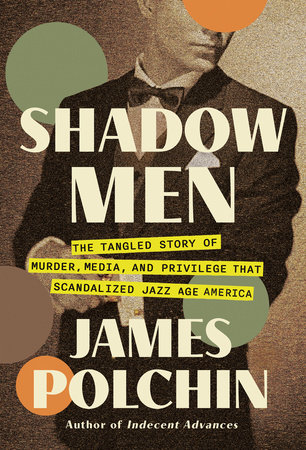Shadow Men: The Tangled Story of Murder, Media, and Privilege That Scandalized Jazz Age America
- By James Polchin
- Counterpoint Press
- 368 pp.
- Reviewed by Dean Jobb
- June 19, 2024
An expertly spun tale of unequal justice in the 1920s.

The body was found at the side of a road in rural Westchester County, north of New York City, on a May morning in 1922. The young man was on his back with his arms at his sides, noted one of the first police officers on the scene, as if laid out by an undertaker. When his vest was unbuttoned, the bloodstained shirt beneath it revealed the cause of death. He had been shot in the chest.
The mystery of who killed the man, and why, would command headlines across the country for more than a year, ignite a political firestorm, and test the fairness of police, prosecutors, and judges. At stake was a question that reverberates from the Jazz Age to our own day: Is there one system of justice for the rich and another for the poor?
In Shadow Men, true-crime writer and New York University professor James Polchin vividly exposes a disturbing, century-old tale of unequal justice. Police soon identified the dead man as Clarence Peters, a drifter and small-time crook from Massachusetts and the kind of hustler any cop or crime reporter might expect would come to a bad end. Within days, a routine homicide was transformed into a cause célèbre when wealthy businessman Walter Ward came forward and confessed that he was the killer.
Ward’s family owned one of the largest bakery conglomerates in the United States, mass-producing bread and cakes like Henry Ford’s assembly lines churned out automobiles. The Wards touted the cleanliness of their factories and goods — baked the “Clean Way,” as one advertisement put it — and produced one out of every five loaves of bread sold in Manhattan in the 1920s. Walter Ward was a company executive, a respected figure in his community, and head of the New Rochelle Police commission. What was his connection to the penniless Peters? And what had provoked Ward to shoot him to death?
Ward never wavered from the story he told in a statement cobbled together by his lawyers. He claimed he had confronted a gang of blackmailers — the “shadow men” of the book’s title — and had killed one of his assailants, Peters, in self-defense. He refused to reveal what the blackmailers were threatening to expose, and the local authorities professed little interest in his secret. “That is a private matter,” was the sheriff’s explanation for this lack of curiosity.
The feisty press took up the challenge of uncovering the truth, with the upstart New York Daily News, America’s first tabloid, leading the charge. Salacious tales of philandering and racetrack gambling were revealed, and there were accusations Ward was a “degenerate” — a derogatory term, at the time, for a homosexual. One witness denounced him as “a scoundrel who lures innocent boys away from their innocence.”
There also was speculation he’d been dealing with blackmailers to cover up the indiscretions of his father, George Ward, the company’s president. Reporters picked apart the dubious confession, shredded Ward’s claim of self-defense, and decried how he was being coddled. New York governor Al Smith was forced to intervene, and the state’s attorney general ultimately put Ward on trial for murder.
Polchin, a finalist for the Mystery Writers of America’s Edgar Award for nonfiction, unravels this sordid and complex tale of prejudice, injustice, and press sensationalism with clinical precision, deep research, and riveting storytelling. “Money and privilege protected the Wards’ secret,” he writes. Would it also shield Walter Ward from a murder conviction and a possible trip to the electric chair? Don’t google the case to find out. Instead, read this gripping and illuminating account and judge for yourself whether justice was done.
Award-winning true-crime author Dean Jobb’s next book, A Gentleman and a Thief: The Daring Jewel Heists of a Jazz Age Rogue (Algonquin Books), will be released later this month. It’s the story of Arthur Barry, who charmed the elite of 1920s New York while planning and executing some of the most brazen jewel thefts in history.

